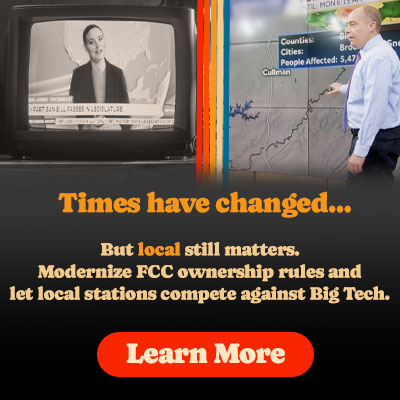
The internet has transformed the media marketplace, yet TV and radio broadcasters are still subject to outdated rules restricting the number and type of outlets they may own. Policymakers should support the continued modernization of these rules to account for the rise, and increasing influence, of digital media.
America's public safety infrastructure is at risk if automakers remove AM radio from vehicles. Policymakers should enact the AM Radio for Every Vehicle Act (S. 315) to keep this vital service as part of their vehicles to ensure Americans can be alerted to impending danger.
The next generation of broadcast television technology will deliver life-saving advanced emergency alerting, stunning pictures, immersive, customizable audio and improved reception - all for free - to enhance and expand your broadcast viewing experience. Because the new technology combines the best of broadcast television and broadband, NextGen TV allows local stations to better personalize their broadcasts with information and interactive features to give viewers the content that is most relevant to them.
Congress should not mandate a new performance royalty on free, local radio stations that would jeopardize local jobs, prevent new artists from breaking into the recording business and harm the hundreds of millions of Americans who rely on local radio. Broadcasters urge legislators to support the Local Radio Freedom Act, which opposes a performance tax, and that last Congress was supported by more than 250 bipartisan members of the House and Senate. Additionally, broadcasters ask legislators to oppose any performance royalty proposal.
Congress should not pass legislation that hurts free, local broadcasting by modifying the tax laws to make advertising more expensive for businesses. Advertising is currently treated as an ordinary and necessary business expense - just like salaries, rent and utilities - under the U.S. tax code. This means a business can fully deduct the expense in the year it was incurred. Some in Congress have suggested changing the tax treatment of advertising for specific types of products, such as pharmaceuticals. This change would have a devastating impact on listeners and viewers of local radio and television stations that rely on advertising revenue to survive, raises significant First Amendment concerns and ignores the important consumer benefits that advertising provides.
The explosion of artificial intelligence (AI) in our daily lives presents great opportunities, but we must approach this new technology responsibly and with caution.
A nearly decade-old proceeding at the Federal Communications Commission (FCC) could impact local television broadcasters' ability to invest and serve audiences with uniquely local and trusted information; however, it doesn't include up-to-date marketplace information regarding the rise, and increasing influence, of digital distribution platforms.

» Broadcasters' Policy Agenda: 119th Congress
» 2026 Congressional Calendar » NABPACJoin our team of broadcast advocates. When legislative issues arise that could impact your station and career, we'll reach out and give you simple steps to contact your legislators.
Sign UpQUESTIONS? NAB members can call our free Legal Hotline to learn more about legislation, filings and updates from Washington.
Call: (866) 682-0276 | Email: legal@nab.org
Access the members-only section that contains talking points, issue briefs and additional tools to help you advocate on legislative issues that matter most to broadcasters.
Access Advocacy Resources